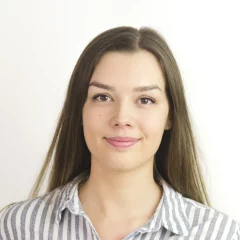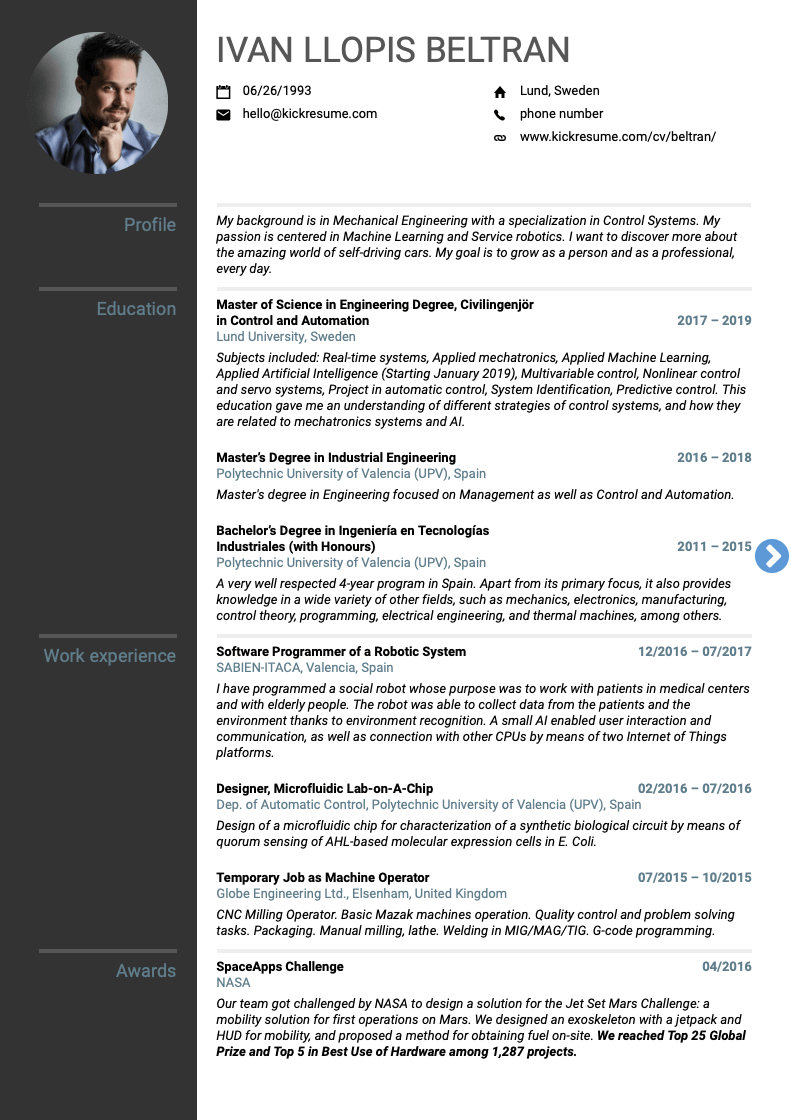Welcome to yet another installment of the Story Behind a Resume. This is where we interview fascinating people with even more fascinating resumes and try to learn their whole story.
This month we've interviewed Ivan, a mechanical engineer who just got an internship at Volvo. He also worked on a jetpack for NASA’s first mission to Mars and bio-hacked a plant to help it protect itself from those nasty tiny larvae that nobody likes.
And he did all of this while still being a student. Because, as if it wasn't enough, he's also pursuing two different master’s in two different countries at the same time.
Right now, Ivan is writing his thesis at Volvo where he's trying to find the right algorithms to predict the future.
Amazing resume for a student, isn’t it? Ivan will tell you about all of these projects and give you some tips if you'd also like to start a career while still at university.
Because that’s what this interview is mainly about — about the importance of doing internships, working on your own projects, and devoting time and effort to something you find worthwhile.
Ivan will tell you:
- What he currently does at Volvo;
- About his projects for MIT and NASA;
- How he programmed a social robot for a medical centre;
- That student activities are a great way start for your career;
- How to manage studies and a meaningful job;
- How internship can land you a future full-time job right after studies;
- And then some.
Congratulations on getting your internship at Volvo! Are you enjoying your time there so far?
Yeah, definitely. I’ve been here two months already. Volvo employs many smart people, so I’m definitely going to learn a lot here.
What exactly are you doing at Volvo?
Apart from the internship, I'm also writing my master's thesis. I really wanted to do it at Volvo because it's in Sweden they're working on many projects that do with artificial intelligence.
I'm on the strategic team. My job is to help them decide what kind of decisions they want to make and where should they focus their attention in the upcoming years. I'm applying artificial intelligence to gather as much useful information as possible.
So we search through the internet, and look for new articles and technologies. Afterwards, my work is to apply machine learning algorithms to predict future trends, and determine which ones are going to be useful and which ones not. Hopefully I will be able to contribute to the future of the company.
So you want to be able to predict what technologies and things are going to be huge in the future?
Exactly. We amass information and filter it, while trying to predict which technologies are here to stay and which ones are going to be short-lived.
Take the fidget spinner, for instance. It was huge for a moment. Yet, barely anyone remembers it now. 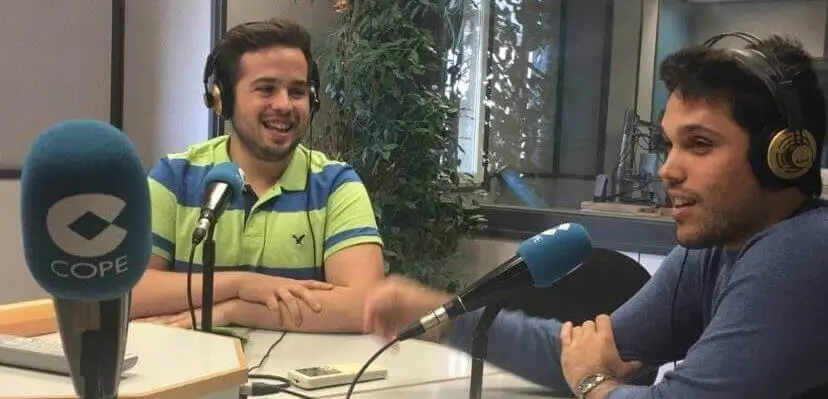
Is this part of your master's thesis?
Yes, exactly. To be more specific, I am doing two master's degrees in parallel. One in Spain and one in Sweden.
Oh wow. Isn't one degree enough? 😃
No. 😃 I wanted more. After my bachelor’s degree, I realized there are many more things I can learn and discover. So I went to do my first master’s. However, then I realized again it could only teach me a small fragment of something bigger and I wanted to do even more.
I talked to an advisor on LinkedIn who suggested that I could join a consultancy company, where I would probably learn a lot, or do a PhD. The double degree was a decision I made in order to master some fields I definitely wanted to master. But I mean, you can join a consultancy company if you have enough skill, but you need at least one master’s to do a PhD. I decided to do two, but I could have gone either way with only one.Ultimately, the double degree helped me acquire the skills necessary to join Volvo Cars. That was actually a risky move because my college only offered two placement positions in Sweden. But I decided to do it anyway and I’m glad I did. But I believe that with decisions like these, there’s nothing you can loose. You can only gain a lot.
You seem to be really convinced about that.
Definitely. It’s never a waste of time. I always say that if you pour all your effort into something and still fail, it’s not your fault. You did everything you could. It’s only your fault if you know you could have tried harder.
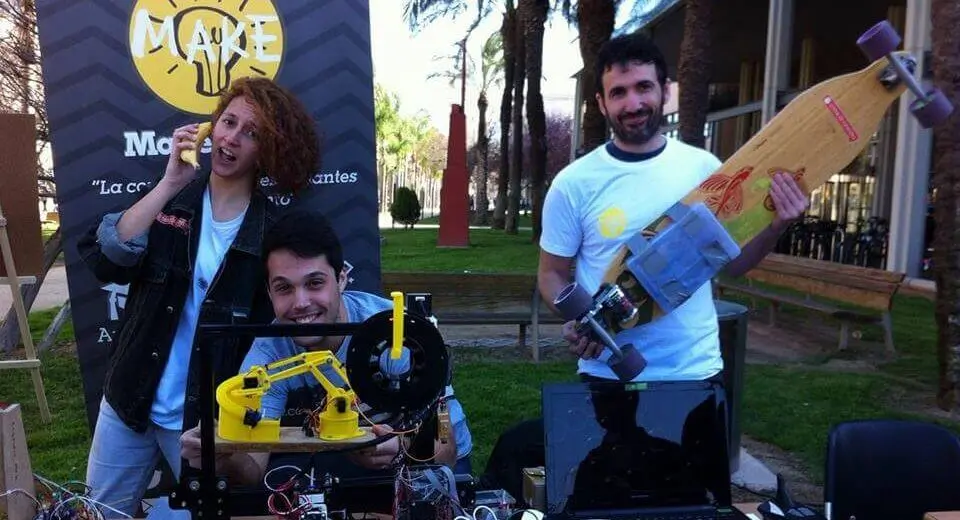
That’s a great mindset. But how do you manage the workload for two degrees at the same time?
Well, it requires good time management but it helps if you're doing related study programs. The knowledge you gain while studying for one program can help you understand new things for the other.
Also, I'm doing one of them remotely. I did the most demanding courses beforehand and the rest of the courses I can do remotely.
As for the master's thesis, when I finish this one, I will go to Spain to do another thesis there. Hopefully, I will finish my studies before September, so I can come back to Sweden and start working here full-time.
Does it mean you're planning to stay at Volvo after finishing your studies?
I would like to. They've already told me I could start working here full-time afterwards. This internship as well as working on my master’s thesis at Volvo helped me a lot. It's a good start for my future career.
Before your internship, you did a lot of cool projects. For example, the one for MIT. Can you tell me about the “The Sexy Plant”?
Sure. iGEM is a worldwide competition in synthetic biology which is organized by MIT every year. They proposed a challenge for students to provide them with something interesting, cool and helpful in their own research. And thanks to them, we did something that has never been done before.
I was a bit scared at the beginning because I didn’t know a lot about biology. But one of the points was to build a multidisciplinary team. If everyone came from the same background, you'd only be able to see the same things and couldn't solve bigger problems. So I attended some webinars, student conferences and studied. I had to understand a bit about biology but my job was mainly programming and doing mathematical models.
Our approach was to prevent moths from eating the plant. Basically, the male moth looks for a female and when they couple, they create maggots. And as they grow, they feed on the plant. Of course, the first thing that might come to your mind is to kill them. But killing is not considered very nice, so we wanted to avoid it.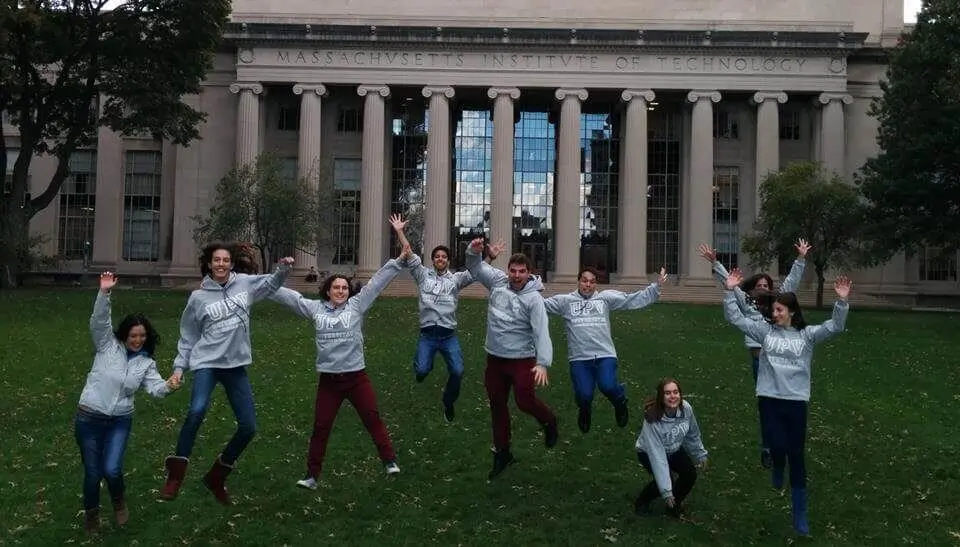
So what did you do?
We thought, what if the moth couple never met? They wouldn't produce the larvae and those, in turn, wouldn't eat the crop.
The solution would be to release a large amount of female pheromones into the air. It would trick the male into thinking he's surrounded by a large number of females. He wouldn't be able to find just one.
If it sounds a bit confusing, I can give you a simple example. Imagine you go to the beach and want to look for a new boyfriend or girlfriend. If there is only one or two people you find interesting, you can identify them very quickly. But if you see two thousand boys or girls you like, you get confused. You don’t know where to look or who to approach first. It’s a bit of a silly example but that's what we did.
Technically, the plant saturates the air with pheromones and overwhelms the insect’s receptors: there are only few real female moths, but the male will think there are actually thousands, making it confusing and difficult to find the real ones. Almost like life itself. 😀
We created a modified plant that was able to release the pheromone into the air. There’s no other plant in the world that does that. We won a prize and got to present in front of many other people. We also visited MIT, which was amazing.
Your CV says you also did a project for NASA. What was that about?
That was a bigger project for the global competition called SpaceApps. NASA challenged us to design a solution for the Jet Set Mars Challenge. They needed a mobility solution for first operations on Mars. It was back in 2016 when Elon Musk said he wants to go to Mars and colonize it.
Our task was to imagine we have a go to Mars and the astronauts have to move around the planet. But how do you do that? The conditions are different, you have a way lighter atmosphere, and, obviously, the place is rather empty. We designed an exoskeleton with a HUD and jet pack for mobility. We also proposed a method for obtaining fuel on-site.
We presented our solution and won the prize for best hardware. Then we went on to the global competition and ended up in the top 5 for best hardware and top 25 overall.
We got multiple mentions in the media, I featured on radio channels in Spain. It was really cool. We met a lot of interesting people and professionals who supported us.
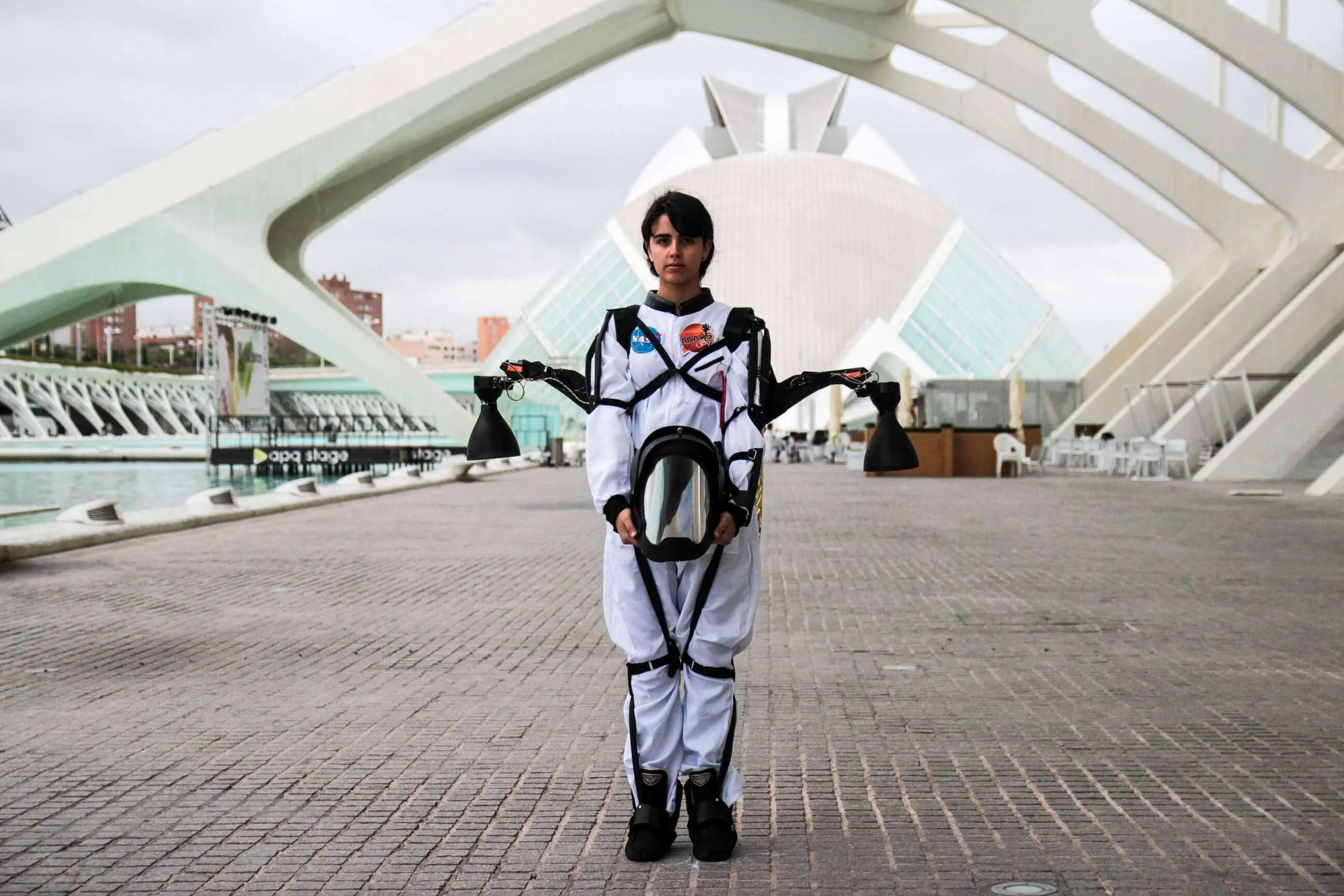
Are they going to use these ideas in the end?
I think they just want to hear new ideas and different solutions. They get to see new points of view and can find something cool to improve their own projects. In some competitions, they contact the winning team further to help them with the development. But that only happens in some competitions, not in this one. In this NASA competition, the winners got to see the launch of their rocket, which is super cool.
Later that year, you programmed a social robot for medical centers. How does it work?
That was part of my internship in Valencia. In the hospital, they told me that older people require a lot of attention. They need someone to interact with them to keep their mind active. So I came up with the idea of a robot that could do just that. Moreover, it could work with the patient's biometric data which hospitals usually store in their information systems.
Let’s say that patient’s amount of sugar in the blood would drop to a certain level. The robot would send an alarm to the doctor together with the room number. So, the doctor would come and check on the patient. Doctors then don’t have to be in the room the whole time. The robot will do that for them.
We equipped him with something like a chatbot, so patients could interact with him. We also wanted to implement facial recognition. However, we lacked time and we didn’t manage to do it before the internship ended.
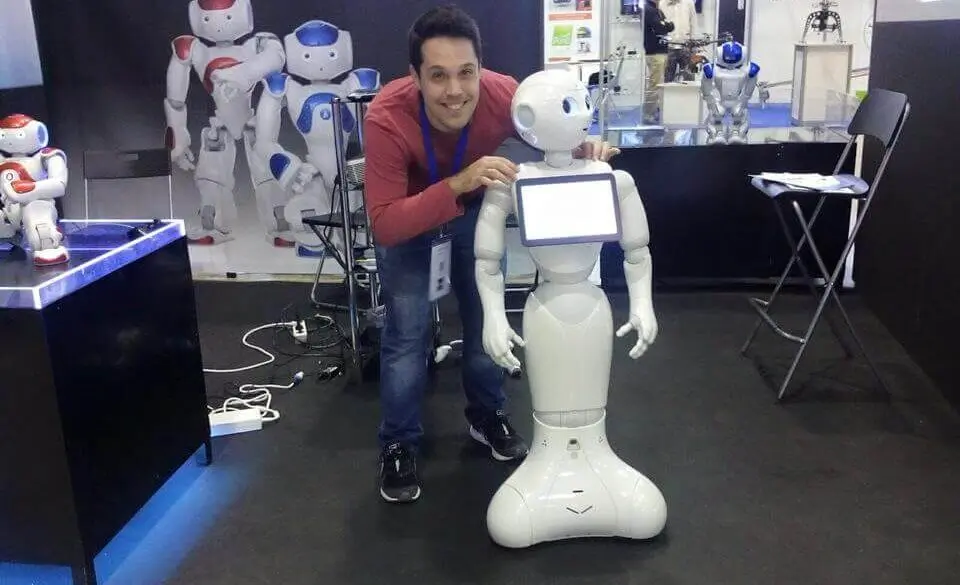
Which one of these projects did you find the most interesting?
Oh, I really couldn’t pick one. That’s a very tricky question. 😃 Each project has provided me with a different kind of experience. The MIT project showed me how interdisciplinary teams can work efficiently. The NASA project taught me how to work in a bigger team and how to organize it.
The robotics project was completely different. It taught me how to work for a hospital and older people. Also, I could see how people working in health care really care about patients. It reminded me to be humble and care about other people.
Since you can’t choose, can you at least say what you like the most about working in the field of automation and robotics?
Probably the idea that I can provide something worthwhile and useful to someone.
The knowledge can be used and applied in many fields, and by many people. That's something that makes me feel like it’s worth it.
Since when are you so interested in this topic?
Since the third grade of my bachelor’s degree when I discovered automation and all the possibilities it offers. You can control any kind of process, you can predict things or create robots. I thought that it’s cool and every company will use this in some way — for machines, cameras, security, anything.
So I started doing some research and digging. I became so enthralled by it that I decided to do a master’s in it. During that time, I discovered machine learning, artificial intelligence and the fact that you can also teach a machine to learn from experience.
Just like our parents were teaching us when we were kids.
For example, your dad told you “this is a truck” and “this is a car”. And he showed you hundreds of examples and then you were able to tell what is a truck and what a car. Machines can do the same. And I thought that was super cool and it will have an enormous impact on the future.
Besides at school, did you have to study a lot by yourself?
Yes, definitely. I was a member of the student’s association called Makers UPV where students can put into practice everything they've learned during lectures. I’ve met many passionate people there. Students who stay up programming after midnight, building robots or attending competitions. When you get to talk to them, you realize they're really smart. They're also people who look at things in a different way. That's something you sometimes can't find in the top classes at school.
All of that comes from doing research, reading articles, watching tutorials and discovering. And passion attracts passion. If you're surrounded by people like these, it rubs off on you. In this way, you can gather knowledge about many things that aren’t part of your studies or you don’t have courses about them.
You can just open Google, Coursera or YouTube where you have video lectures from MIT or Stanford. And they're available completely for free. The tools are there and it’s up to you invest enough time to take advantage of it.
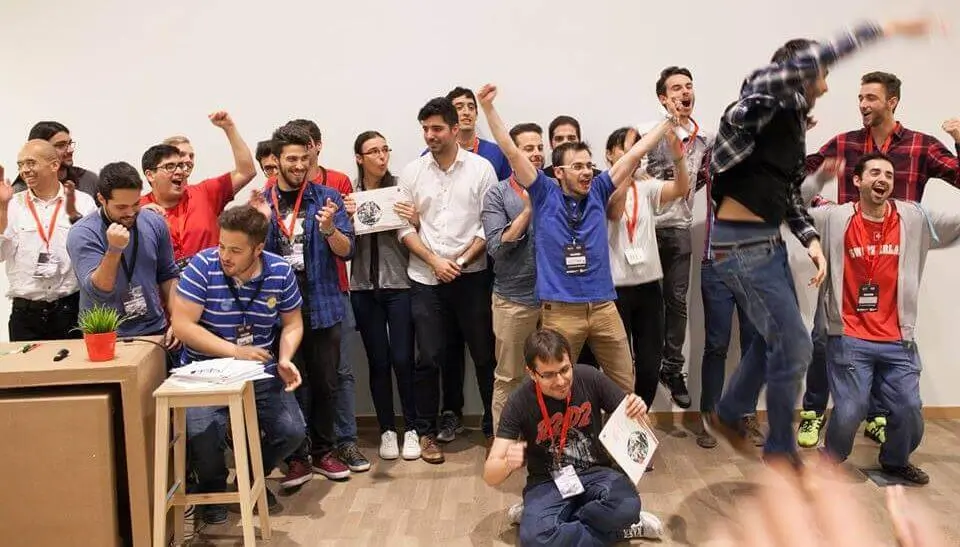
Do you find it important to work during studies?
Definitely. Working at a company gives you something you won't regret when you'll start looking for a real job. Nowadays, numberless people have a degree. You're just one of the many. What can distinguish you from others is your job experience. That proves that you can do something already during your studies.
It’s hard to get into at the beginning. But all you have to do is show your passion and willingness to work. Ultimately someone will give you a chance. If you gain this experience during your studies, it’s much easier for you to find a job afterwards. You learn a lot and it sets you up with professional contacts. It also gives you independence. In the end, you'll have many more doors open.
It can be hard to combine studies with a meaningful job. Do you have any tips for other students on how to manage it?
The main point is to find something you like, then you realize it’s not a job. It's also important to realize that the hours you invest in it, will be a big plus for once you finish school.
Also, I like to remind myself that one can get used to anything. Like when you start running, the first week is super tough but you get used to it. If you commit yourself to something because you want to, not because you have to, you can achieve a lot.
In awe of Ivan's story? Harness that inspiration to craft your own standout resume. Use our AI resume builder to illustrate your unique experiences and innovative skills.

